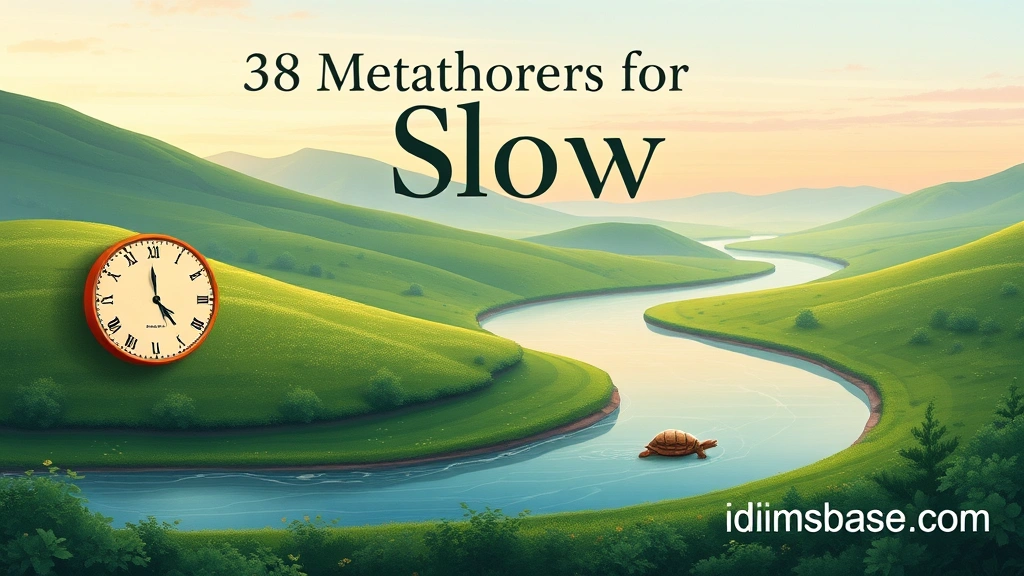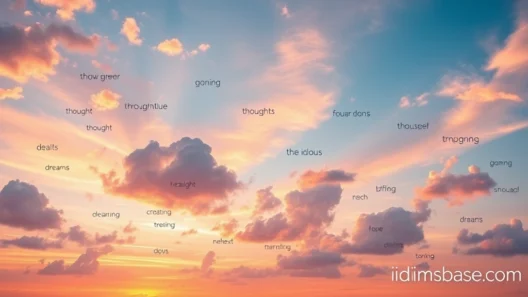Have you ever found yourself waiting, and waiting, and waiting for something to happen? Perhaps a project at work, a friend to arrive, or even just your internet connection to speed up? That feeling of things moving at a snail's pace can be incredibly frustrating, right? But what if we told you there are countless creative, witty, and even beautiful ways to describe that very sensation?
Sometimes, simply saying "it's slow" just doesn't cut it. You need a phrase that truly captures the glacial pace, the molasses-like movement, or the agonizing crawl. That’s where metaphors come in! They paint a vivid picture in your mind, making your description much more impactful and engaging. Let's dive into 38 fantastic metaphors for "slow" that will spice up your vocabulary and make your communication shine!
38 Metaphors for Slow
Get ready to explore a treasure trove of expressions that perfectly capture the essence of slowness.
- Slower than molasses in January: This classic paints a picture of extreme stickiness and cold, making movement nearly impossible.
- Moving at a snail's pace: The quintessential image of slowness, everyone knows how leisurely a snail moves.
- Like watching grass grow: This one perfectly describes something so slow, it’s practically imperceptible.
- A watched pot never boils: Impatience makes time seem to drag, even if the process is normal.
- Creeping like a shadow: Suggests a slow, stealthy, and almost unnoticed progression.
- Drifting like a feather: Implies a gentle, unhurried movement, carried by the slightest breeze.
- Crawling like a baby: A very early stage of movement, inherently slow and often wobbly.
- Like a sloth on tranquilizers: Sloths are already slow, so imagine one even more relaxed!
- Slower than a turtle in peanut butter: A humorous image of something struggling against resistance.
- Like time standing still: When moments stretch out endlessly, giving the feeling of no progress.
- At a glacial pace: Glaciers move, but so imperceptibly slowly that you’d never notice their progress in real-time.
- Like wading through treacle: Treacle (or molasses) is thick and sticky, making movement difficult.
- Stuck in neutral: A car engine running but not moving forward.
- Like a broken record: Repetitive and not progressing to the next track.
- Slower than dial-up internet: A nod to a bygone era of painfully slow connections.
- Like paint drying: Another classic for something incredibly dull and slow to complete.
- Moving in slow motion: As if time itself has decelerated.
- Like a sleepy river: A river that meanders gently, without any rushing currents.
- At a snail's crawl: Emphasizing the very lowest speed of a snail.
- Like molasses uphill: Combining the stickiness of molasses with the added difficulty of an incline.
- Like a week in a wet sock: An unpleasantly long and drawn-out experience.
- Like a caterpillar on a cross-country trip: Caterpillars move slowly, and a long journey makes it even more pronounced.
- Slower than continental drift: A geological process that takes millions of years.
- Like growing stalactites: The formation of cave structures, taking eons to develop.
- Like a camel through the eye of a needle: An age-old biblical metaphor for something incredibly difficult and slow to achieve.
- Like a funeral procession: A somber event where movement is deliberately slow and respectful.
- Like a Sunday driver: Someone driving leisurely, often frustrating others in a hurry.
- At a leisurely stroll: A pleasant, unhurried walk.
- Like pulling teeth: A painful and extremely slow process.
- Like a long, drawn-out sigh: An exhalation that takes its time to release.
- Like a ticking clock with dead batteries: The second hand barely moving.
- Like a sloth in quicksand: An already slow creature facing an incredibly resistive environment.
- Like water torture: A slow, agonizing, and drawn-out form of torment.
- Like a glacier melting: A process that is very gradual and takes a long time.
- Like a sleepy tortoise: Tortoises are known for their slow, deliberate movements.
- Like watching a plant grow: Similar to grass, but perhaps implying a more substantial, yet still slow, development.
- Like a caterpillar inching along: Highlighting the small, incremental movements.
- Like a sloth climbing a tree: A slow, methodical ascent.
Key Takeaways

- Metaphors make your language more vivid and impactful.
- Describing "slow" doesn't have to be boring; it can be incredibly creative.
- Choosing the right metaphor can convey not just slowness, but also frustration, patience, or even serenity.
- These phrases can enhance your writing, conversations, and storytelling.
Frequently Asked Questions (FAQ)
Q1: What is a metaphor, and why is it useful?
A metaphor is a figure of speech that directly compares two unlike things without using "like" or "as." For example, "time is a thief." It's incredibly useful because it helps you explain complex ideas, evoke emotions, and create vivid images in the reader's or listener's mind, making your communication more engaging and memorable.

Q2: How can I choose the best metaphor for "slow"?
Consider the context and the emotion you want to convey. If you're expressing extreme frustration, "slower than molasses in January" or "like pulling teeth" might be perfect. If you're describing something gently unhurried, "drifting like a feather" or "like a sleepy river" could be more suitable. Think about the specific nuances of "slow" you want to highlight.
Q3: Are these metaphors suitable for all types of writing?
Many of these metaphors are versatile and can be used in various contexts, from casual conversation to creative writing. However, always consider your audience and the tone of your piece. Some metaphors are more informal or humorous ("like a sloth on tranquilizers"), while others are more poetic ("creeping like a shadow"). Choose what fits best!

Q4: Can I create my own metaphors for "slow"?
Absolutely! The beauty of language is its flexibility. Think about things that inherently move or progress very slowly in your experience. For instance, "like a queue at the post office on Christmas Eve" or "like a download bar stuck at 99%." The more original and relatable your metaphor, the more impactful it can be.
Q5: How do metaphors differ from similes?
The main difference is the use of "like" or "as." A simile compares two things using "like" or "as" (e.g., "slow as a snail"), while a metaphor states that one thing is another (e.g., "time is a river"). Both are powerful literary devices, but metaphors offer a more direct and often more profound comparison.
There you have it! A comprehensive collection of metaphors to describe anything that moves at a less-than-blistering pace. We hope this list empowers you to express yourself with greater precision, humor, and creativity. Which one is your favorite? Do you have a go-to metaphor for "slow" that we missed? Share your thoughts and let's keep the conversation going!






